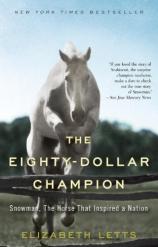Interview: October 27, 2011
In THE EIGHTY-DOLLAR CHAMPION, award-winning author Elizabeth Letts tells the incredible true story of rider Harry de Leyer and his horse, Snowman. In November 1958, Harry and Snowman, outsiders to the wealthy horseback-riding culture, won the National Horse Show at Madison Square Garden against all odds. Letts narrates the unbreakable relationship between the two and the story behind their success. In this interview, conducted by Bookreporter.com’s Alexis Burling, Letts describes her original discovery of the story, which led to a phone conversation with de Leyer himself. She also shares some of her childhood experiences with her own horse, Pretty Boy Floyd, recommends a few of her favorite horse-related books, and gives advice on how anyone can become involved in the world of horses.
Bookreporter.com: THE EIGHTY-DOLLAR CHAMPION is such an inspirational story! You provide a lovely answer to this question on your website, but for those who haven't seen it, what prompted you to write this book?
Elizabeth Letts: I came across this story by accident, although now, it seems like somehow I was meant to find it. I was surfing the web when I stumbled across an extraordinary picture: an old black-and-white photo of a horse jumping over another horse. What stopped me in my tracks was the expression on the horse’s face. He looked so relaxed and happy that I wanted to know the story behind the picture. I knew that something must have caused the horse to have such extraordinary trust in his rider, and after doing a little bit of research, I realized that the horse and the man shared a special bond.
BRC: Throughout the book, you pack the pages with historical background and information describing the type of life a horse could expect in the early to mid-1900s --- what type of work they were used for, how their role in American industry evolved, what else was going on in the world at the time the story took place, etc. You do this while also recounting the story of Harry and Snowman's rise to fame. What tricks of the trade did you use to create an accurate historical picture while also delivering a good story?
EL: I completely immersed myself in research in order to find out the story behind the story. I wanted to know what it was about this man and horse team that had so captured the hearts of people across the country, and I thought I needed to understand what people’s and horses’ lives were like back then. I also spent many hours interviewing both Harry and other people who had known him, which allowed me to get very close to the subject. This is a true story that reads like fiction, and I wanted to work hard to make the history interesting and engaging so that it felt like a natural part of the story.
BRC: THE EIGHTY-DOLLAR CHAMPION was published as a book for adults, but I would argue that it's a perfect read for teens as well, especially those who love animals. Did you have this in mind while writing the book?
EL: Absolutely, yes. Since writing the book, I’ve met many people who first heard the story of Snowman back when they were teens, almost 50 years ago. It’s amazing how many of those people never forgot the incredible story of the rescued plow horse, and who still, to this day, are involved in careers that help animals, such as veterinary medicine, or fostering puppies, or working in wildlife conservation. There is something about teens that makes them especially open to understanding the special bond that can sometimes occur between humans and animals. I’m excited that a whole new generation of readers may get a chance to know this story.
BRC: You write a lot about how the advent of new media (mainly, the television) played a big role in boosting Snowman's reputation. I loved the bit about the time when then-guest host Johnny Carson mounted Snowman backwards while interviewing Harry on “The Tonight Show.” Do you think Snowman's long reign of fame would be possible today in such a fast-paced and tech-heavy society where one day's headlines are the next day’s old news?
EL: That’s an interesting question. What I think was really different back then was that once something passed, you couldn’t push a button and watch it again. Snowman was on live TV, and everyone who was watching that night got to see it, but there was no YouTub, no video, no way to replay that experience. But clearly, the story itself was unforgettable, and people were able to remember it --- it stuck with people. I do not think that has changed at all. Lots of things are here today and gone tomorrow, but the really great stories, whether books, or movies, or TV shows, tend to stick with us. This is that kind of unforgettable story.
BRC: You do a great job describing how horse shows and riding were perceived in the 1950s. How do you think the sport is viewed today?
EL: You know, I wrote a lot in the book about how the sport was dominated by very wealthy society people who were not very welcoming to outsiders. Today, I think it really depends. Horseback riding is an incredibly diverse sport, with everything from barrel racing to endurance riding, to jumping and simple trail riding. There are still a lot of wealthy people involved in the sport, but there are just as many people who do it for the love of it, and who scrimp and save just to be able to spend time with the magnificent animals. I don’t think that lack of funds should deter anyone with a love of animals from getting involved --- one area where there is a great need for volunteers is the area of horse rescue. We have many unwanted horses who are in need of care, and volunteers make all of the difference for them. I think the “snobby” label is less true now than it was back then.
BRC: One of the most shocking things that came up in reading your book was not the fact that Snowman won all those races (hey, I root for the underdog), but that Harry could've had his tongue removed because of a mistake in lab results after a routine trip to the doctor. Did you know this tidbit when you first started researching the book?
EL: No, I was absolutely stunned when I first learned about it, and I have to say that what really impressed me was the way that Harry handled it. None of us know what we would do if we came up against a terrible situation like that, and Harry was so calm and courageous about it, that I found it very inspiring.
BRC: Without giving anything away, I was surprised to read some of the story developments contained in the Epilogue. Did you ever toy with leaving this part out and, instead, ending the book at an earlier time in Harry's life?
EL: No, it never occurred to me to end the story earlier, and not introduce the reader to Harry de Leyer today. We hear so many stories about people who become celebrities, but once the spotlight moves on, the person falls apart, the rest of their life never seeming to live up to their moment of fame. But I found that Harry was just the opposite. He loved horses, and riding, and he loved being a teacher. He was famous all over the world when he was competing on Snowman, but after Snowman, he continued to do what he loved. Life goes on and people change, but for Harry, his great love of horses and for teaching children to ride has been a constant throughout his life. He has figured out a way to spend every day doing what he loves until he is in his 80s. To me, that is a big part of who Harry is, and what makes him so inspiring.
BRC: Did you read horse books when you were a kid? Might you recommend one of your favorites to your readers?
EL: Oh my goodness, yes. I am pretty sure I devoured every horse book ever written. Hard to choose a favorite, but two that I read and reread were KING OF THE WIND by Marguerite Henry and LITTLE VIC by Doris Gates. Another that I read recently and loved was THE HEARTS OF HORSES, a novel about a young female horse-breaker that I think teens would enjoy.
BRC: You have been a horse-lover ever since you were a little girl, with a fairly impressive track record. Isn't it true that as a teen, you were a runner-up in the California Horse and Ride of the Year competition? What that day must've felt like! Growing up, did you have a case full of medals and ribbons from horse competitions?
EL: Yes, it was a thrill when my horse, Pretty Boy Floyd, and I were named runner-up California Horse and Rider of the year in three-day eventing, a sport that involves a series of riding tests over the course of three days. I remember that the competition was stiff and that there was no junior division so I was competing against adults. I did win a lot of trophies and medals along the way, but my favorite memories of riding have nothing to do with competition. The best times were the hours I spent alone on my horse riding on the trails. I also had a bit of a wild side, and my horse and I would jump over almost anything (although never another horse). I always loved the thrill of jumping.
BRC: Do any of your children show an interest in caring for or riding horses?
EL: My youngest is the one who likes horses and riding. I think it’s because he grew up hearing me talk about Harry de Leyer and Snowman so much.
BRC: Did writing THE EIGHTY-DOLLAR CHAMPION rekindle your affection for competing in horse shows? Did you go to many during the time you spent researching the book?
EL: Actually, I don’t think I went to a single horse show while I was writing the book. That’s the funny thing about writing books --- you spend so much time writing and researching that you have hardly any time left to do the things that you love. I don’t have a great desire to start competing in horse shows myself again, but I do have a secret equestrian dream, and that is to take up endurance riding.




